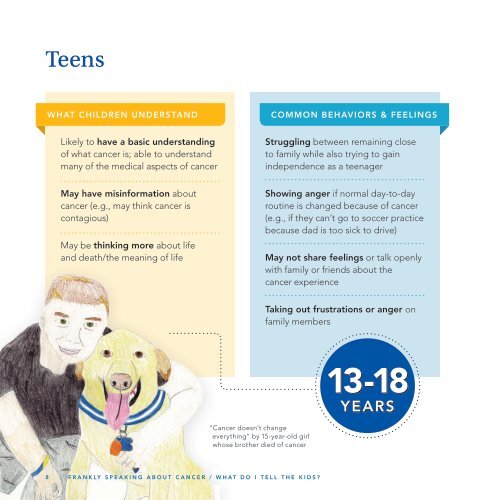Frankly-Speaking-About-Cancer-What-Do-I-Tell-the-Kids
Frankly-Speaking-About-Cancer-What-Do-I-Tell-the-Kids
Frankly-Speaking-About-Cancer-What-Do-I-Tell-the-Kids
Create successful ePaper yourself
Turn your PDF publications into a flip-book with our unique Google optimized e-Paper software.
Teens<br />
WHAT CHILDREN UNDERSTAND<br />
COMMON BEHAVIORS & FEELINGS<br />
Likely to have a basic understanding<br />
of what cancer is; able to understand<br />
many of <strong>the</strong> medical aspects of cancer<br />
Struggling between remaining close<br />
to family while also trying to gain<br />
independence as a teenager<br />
May have misinformation about<br />
cancer (e.g., may think cancer is<br />
contagious)<br />
May be thinking more about life<br />
and death/<strong>the</strong> meaning of life<br />
Showing anger if normal day-to-day<br />
routine is changed because of cancer<br />
(e.g., if <strong>the</strong>y can’t go to soccer practice<br />
because dad is too sick to drive)<br />
May not share feelings or talk openly<br />
with family or friends about <strong>the</strong><br />
cancer experience<br />
Taking out frustrations or anger on<br />
family members<br />
“<strong>Cancer</strong> doesn’t change<br />
everything” by 15-year-old girl<br />
whose bro<strong>the</strong>r died of cancer<br />
13-18<br />
YEARS<br />
8 FRANKLY SPEAKING ABOUT CANCER / WHAT DO I TELL THE KIDS?


